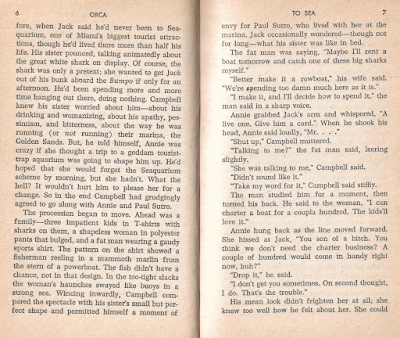Peter Benchley couldn't have imagined the tidal wave of derivative terror he'd unleash after the publication of his Jaws in 1974, but in the wake of the blockbuster film adaptation in '75 a legion of Hollywood hacks and pulp fiction scribblers were soon swarming like ... well, like sharks, in a feeding frenzy over a newly revived genre based in an age old terror of the sea and handed down fishermen's tales of impossible, implacable monsters. And soon enough, among the schools of sharks, other denizens of the deep were being dredged up to serve as villains: piranha, giant octopus, plesiosaurs (and monster birds).
Enter Italian mega-producer Dino de Laurentiis, who tasked his filmmakers to "find a fish tougher and more terrible than the great white" in order to take a bite of that boffo benthic box office.
Enter the killer whale. Truly an awesome beast, though some dramatic liberties were taken in adapting Orcinus orca for the big screen. To whit, the oft-repeated blurb about the orca's vengeance drive, featured in the film's trailer, poster, and on the back cover above, and some old fishwives' tales of orcas eating human prey. This was the Wild West era of marine biology, when myth still mingled with scientific methodology in the popular mind. All the more appropriate that the filmed version of Orca climaxes amid a patently phony landscape of styrofoam icebergs filmed in sunny, balmy Malta. But we're here for the novelization, and such budgetary shortfalls shouldn't concern us on the printed page. In fact, Herzog delivers a riveting climax for his novel, though there's some rough seas getting there.
If anyone could pull off a rote adaptation of a mercenary genre flick, it seems like it'd be author Arthur Herzog, previously responsible for the killer bee catastrophe The Swarm, which ended up adapted by Irwin Allen for one of his late-career bombs in 1978. But here he almost bungles things right out of the gate! The first chapter is a complete waste, pure filler with salty dog Jack Campbell, his sister Annie, and her beau Paul taking a trip to the aquarium to see a stuffed shark and a performance by a pair of orcas. It's a deadly dull way to begin a thriller about death on the high seas - we're stuck in suburban Miami, for Chrissakes, when we should be feeling the spray on our face and the ocean roll under our feet! Jack fantasizes about his sister's sex life with her boyfriend in some typical '70s weirdness, sizes up some unattractive tourists, and listens to a very unscientific spiel about orcas from the show trainers, complete with the invented orca vengeance drive and spurious tales of human consumption. We're also gifted some early editing gaffes, with a "great white" accidentally described as a "great whale" on page five. Things aren't looking good here.
But slowly, surely, Herzog builds up a head of steam. Once we're witness to a shark bitten in half (take that, Jaws!), the first, disposable crewman chowed down on, and an orca miscarriage all in one go, we're off to the races! I'm not sure if Herzog was working with an earlier script, or if he perhaps wrote Orca first and then had it snapped up by De Laurentiis for his killer whale movie, but there are a few differences between the book and film. The pointless first chapter in Miami is thankfully absent from the film, and the character of Annie (played by Bo Derek) isn't related to Campbell as in the book. The climax is different too, with a spoiler following for the book: the whale doesn't kill Campbell! The beast leaves him a broken man adrift on the ice, having lost everything in his futile pursuit - his ship, his crew, his sanity. Now this is some high drama, though the preceding pages were somewhat waterlogged.
3/4
Pocket Books, 1977









No comments:
Post a Comment